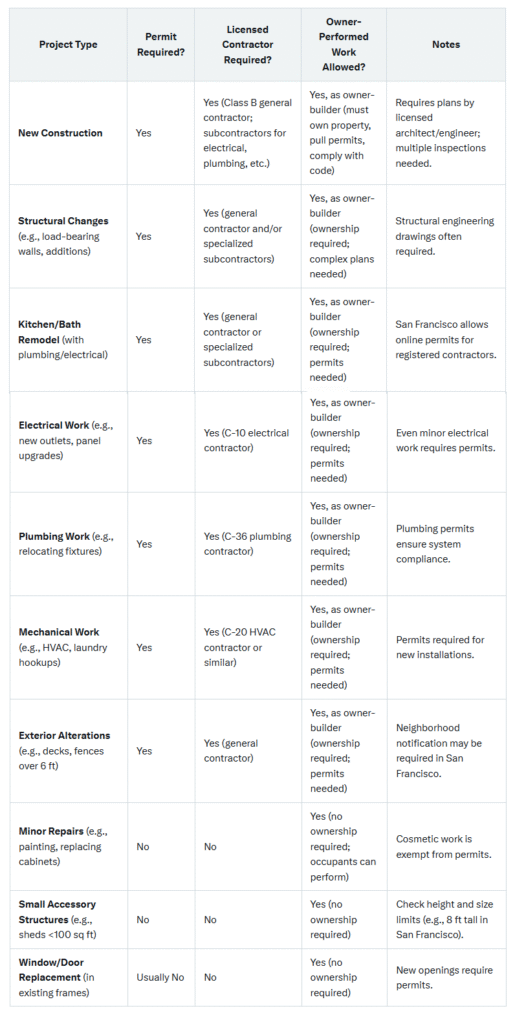Navigating Remodeling Permits and Contractor Licensure in the San Francisco Bay Area
Home remodeling projects in the San Francisco Bay Area can transform your living space, increase property value, and enhance functionality. However, before you pick up a hammer or hire a contractor, it’s critical to understand when permits are required and whether a licensed contractor is necessary. This guide covers permit requirements for various projects, the necessity of licensed contractors for general contracting and remodel work, and the legality of owner-performed work across most counties in the Bay Area, including San Francisco, Alameda, Contra Costa, Marin, San Mateo, and Santa Clara.
Understanding Remodeling Permits
Permits ensure that construction and remodeling projects comply with local building codes, zoning laws, and safety standards. In the Bay Area, permit requirements vary slightly by county and municipality, but the California Building Standards Code provides a baseline. Most projects that alter a building’s structure, electrical, plumbing, or mechanical systems require permits. Failure to obtain permits can lead to fines, project delays, or complications when selling your home.
Common Projects Requiring Permits
Here are examples of projects—big and small—that typically require permits in most Bay Area counties:
- Large Projects:
- New Construction: Building a new home or adding a significant addition (e.g., a new room or accessory dwelling unit).
- Structural Changes: Removing or altering load-bearing walls, modifying foundations, or adding stories to a home.
- Major Renovations: Kitchen or bathroom remodels involving plumbing, electrical, or structural changes (e.g., relocating fixtures, upgrading electrical panels, or changing floor plans).
- Exterior Alterations: Adding decks, balconies, or exterior stairs; constructing fences over 6 feet; or installing large retaining walls (over 4 feet in height).
- Large Projects:
- Small Projects:
- Electrical Work: Installing new outlets, upgrading electrical panels, or moving existing wiring.
- Plumbing Work: Adding or relocating plumbing fixtures (e.g., sinks, toilets, or showers) or upgrading water heaters.
- Mechanical Work: Installing or replacing HVAC systems, laundry hookups, or ventilation systems.
- Window and Door Replacements: Cutting new openings for windows or doors (though replacing windows in existing frames may not require a permit in some cases).
- Small Projects:
Projects That Don’t Require Permits
Some minor projects are exempt from permits, though exemptions vary by county. Common examples include:
- Painting, wallpapering, or refinishing floors.
- Replacing faucets or fixtures without altering plumbing valves or traps.
- Building small accessory structures (e.g., sheds under 100 square feet and 8 feet tall in San Francisco).
- Fences under 6 feet at rear or side lot lines.
- Minor repairs (e.g., replacing up to 25% of a roof or repairing plaster walls).
Always check with your local building department, as exemptions can differ. For instance, San Francisco has specific exemptions listed in the San Francisco Building Code Section 106A.2.
Licensed Contractor Requirements
Whether a licensed contractor is required depends on the project’s scope, permit requirements, and local regulations. In California, the Contractors State License Board (CSLB) oversees licensing, and a licensed contractor is generally required for projects involving significant construction, electrical, plumbing, or mechanical work.
General Contracting (New Construction or Remodels with Plumbing, Electrical, and Structural Components)
Licensed Contractor Necessity: For new construction or remodels involving plumbing, electrical, or structural components, a licensed general contractor (Class B license) is typically required to pull permits and oversee the project. Subcontractors for specialized work (e.g., electrical or plumbing) must hold specific licenses (e.g., C-10 for electrical, C-36 for plumbing).
Owner-Builder Exception: Homeowners can act as “owner-builders” and pull permits themselves for work on their own property, but this comes with caveats:
- Ownership Requirement: You must be the property owner listed on the title/deed. Occupants (e.g., renters) cannot pull permits unless authorized by the owner.
- Responsibility: Owner-builders are legally responsible for ensuring work meets code. If unpermitted work is discovered, fines can be double the original permit cost, and you may need to redo the work.
- Complexity: Projects involving structural, electrical, or plumbing work often require plans prepared by a licensed architect or engineer, making professional involvement advisable.
- Limitations: Owner-builders cannot hire unlicensed workers for permitted work, and some counties may restrict owner-builder permits for complex projects.
Remodel Work
Permitted Remodel Work:
- Licensed Contractor: For projects requiring permits (e.g., kitchen or bathroom remodels with plumbing or electrical changes), a licensed contractor is generally required to pull permits and perform the work. In San Francisco, registered contractors can apply for permits online for kitchen/bath remodels, electrical, or plumbing work.
- Owner-Performed Work: Owners can perform permitted work themselves as owner-builders, provided they pull the necessary permits and comply with code. However, complex projects often require professional expertise to pass inspections.
Non-Permitted Remodel Work:
- Licensed Contractor: For minor, non-permitted work (e.g., painting or replacing cabinets), a licensed contractor is not required. However, hiring a licensed professional ensures quality and compliance with best practices.
- Owner-Performed Work: Owners or occupants can perform non-permitted work without restriction, as long as it doesn’t involve systems requiring permits (e.g., electrical or plumbing). No ownership is required for cosmetic work.
Risks of Unpermitted Work
Undertaking work without permits or using unlicensed contractors can lead to:
- Fines (often double the permit cost).
- Orders to redo or remove work.
- Complications during home sales, as unpermitted work may deter buyers or lenders.
- Safety hazards from substandard work.
County-Specific Notes
While the California Building Standards Code applies statewide, Bay Area counties have unique requirements:
- San Francisco: Strict permitting rules due to density and historic preservation. The Department of Building Inspection (DBI) oversees permits, and neighborhood notification is required for many exterior or expansion projects.
- Alameda County: Permits are required for most structural, electrical, or plumbing work. Check with individual cities (e.g., Oakland, Berkeley) for specific rules.
- Contra Costa County: Similar to Alameda, with requirements for inspections during construction. San Pablo, for instance, requires permits for most remodeling and repairs.
- Marin County: Historic properties may need additional approvals. Pre-application meetings with the building department are recommended for unique projects.
- San Mateo County: Permit fees for kitchen/bath remodels are based on project valuation, including labor and materials. Plans are required for most remodels.
- Santa Clara County: Strict zoning laws and requirements for inspections (e.g., foundation, framing, electrical). Historic properties may need Historical Heritage Commission approval.
Practical Tips
Research Local Requirements: Visit your county or city’s building department website (e.g., sfdbi.org for San Francisco, smcgov.org for San Mateo) or use resources like the San Francisco Property Information Map to check zoning and permit needs.
Consult Professionals: Engage a licensed architect, engineer, or contractor early to streamline the permit process and ensure compliance.
Schedule Inspections: For permitted work, schedule inspections (e.g., foundation, electrical, final) to verify code compliance.
Document Everything: Keep records of permits, plans, and inspections for future reference, especially when selling your home.
Consider Permit Services: Companies like PermitFlow can automate and expedite the permitting process
Conclusion
Navigating remodeling permits and contractor requirements in the San Francisco Bay Area requires careful planning and adherence to local regulations. Most projects involving structural, electrical, plumbing, or mechanical changes require permits, and licensed contractors are typically needed to ensure compliance. Homeowners can perform work as owner-builders, but only if they own the property and obtain necessary permits. For minor, non-permitted work, owners or occupants can proceed without licenses, but professional expertise is still recommended for quality results. Always check with your local building department to confirm requirements, and consider consulting professionals to avoid costly mistakes. By understanding these rules, you can ensure a smooth, legal, and successful remodeling project.
Sources:
- San Francisco Department of Building Inspection (sfdbi.org)
- SF Planning (sfplanning.org),
- California Contractors State License Board (cslb.ca.gov)
- San Mateo County (smcgov.org)
- Santa Clara County permitting guide (nonaehyaei.com)

